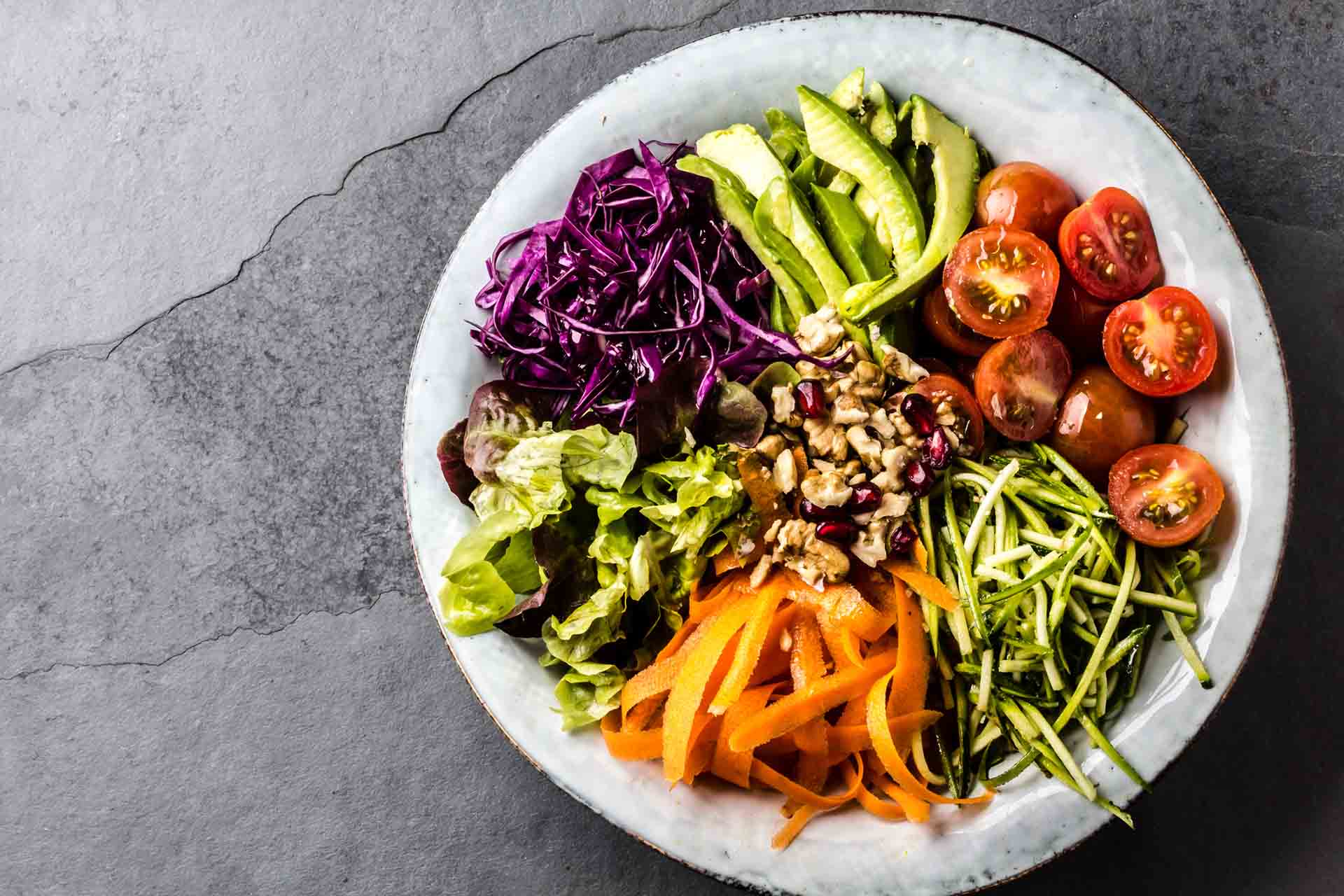Uncovering the Benefits of Plant Based Meals in Supporting Healthy And Balanced Food Choices
Plant-based meals supply many advantages that can boost healthy eating routines. They prioritize nutrient-dense active ingredients, adding to overall health. These meals are abundant in necessary vitamins and minerals, which can bring about boosted energy levels and food digestion. Additionally, they play a substantial role in weight monitoring and chronic condition prevention. The implications expand beyond personal wellness, touching on environmental sustainability. Discovering these facets exposes an engaging case for incorporating much more plant-based foods into everyday diet regimens.
Comprehending Plant-Based Diet Plans
What specifies a plant-based diet? A plant-based diet plan largely consists of foods originated from plants, consisting of vegetables, fruits, grains, seeds, and nuts. While it highlights plant foods, it is not always vegan or vegan; some people might include percentages of pet items. The core principle rotates around focusing on plant foods for their nutritional advantages and environmental sustainability. This diet motivates the intake of whole, minimally refined foods, commonly bring about an increased consumption of vital nutrients. Furthermore, plant-based eating promotes culinary imagination, as individuals check out diverse recipes and flavors. Eventually, a plant-based diet plan can be adjusted to fit various way of livings and choices, making it an adaptable choice for those seeking to integrate even more plant foods right into their dishes.
Wellness Conveniences of Plant-Based Foods
A plant-based diet provides a wide range of health and wellness benefits that can enhance overall wellness. Research shows that people following this diet regimen often experience lower threats of persistent conditions, such as cardiovascular disease, diabetic issues, and particular cancers. Rich in vitamins, antioxidants, and minerals, plant-based dishes sustain immune feature and promote mobile health. These diets are generally high in nutritional fiber, which helps digestion and aids keep healthy cholesterol degrees. The incorporation of entire foods, such as fruits, vegetables, beans, and whole grains, contributes to enhanced energy degrees and mental clarity. In addition, the anti-inflammatory buildings found in many plant-based foods can aid decrease swelling in the body, promoting far better cardio and joint health and wellness.
Impact on Weight Administration
The impact of plant-based dishes on weight administration can be considerable due to their nutrient thickness and lower caloric consumption. These meals usually supply vital minerals and vitamins while minimizing vacant calories, promoting much healthier eating routines. Consequently, individuals might find it simpler to keep or lose weight with a plant-based diet.
Nutrient Density Conveniences
While numerous diet plans focus on calorie constraint, the concept of nutrient density uses an extra holistic approach to weight monitoring. Nutrient-dense foods are abundant in vitamins, minerals, and antioxidants while being lower in calories. This enables people to take in larger portions without exceeding their caloric requirements. Plant-based dishes, which usually include fruits, vegetables, entire grains, and beans, exhibit nutrient thickness. These foods not only support weight monitoring yet additionally promote satiation, minimizing the chance of over-eating. Additionally, a high intake of nutrient-dense foods can result in enhanced metabolic wellness, as they give the needed nutrients for peak physical function. Eventually, prioritizing nutrient density can facilitate healthier eating patterns and add to lasting weight administration methods.
Lowered Calorie Consumption
Minimized calorie consumption plays a substantial duty in effective weight management, as it directly influences an individual's energy equilibrium. Plant Based Chicken. Plant-based meals are usually lower in calories while being rich in essential nutrients, making them a perfect choice for those looking for to lower calorie intake without compromising nourishment. By including a lot more fruits, vegetables, entire grains, and legumes, people can appreciate bigger part sizes that promote satiation. This strategy not only aids in weight loss but also cultivates lasting eating behaviors. Furthermore, plant-based diet regimens often lower the intake of refined foods high in sugarcoated and unhealthy fats, which can add to excess caloric consumption. Inevitably, a concentrate on plant-based dishes can support healthier weight administration techniques and lasting wellness
Reducing the Danger of Chronic Illness
Including plant-based meals right into one's diet can substantially reduce the threat of chronic conditions. Various researches demonstrate that diet plans abundant in fruits, veggies, entire grains, and vegetables are connected with lowered incidences of cardiovascular disease, diabetes mellitus, and certain cancers cells. The high fiber web content of plant-based foods adds to better digestion wellness and boosted cholesterol levels, while antioxidants and phytochemicals discovered in these foods might aid battle inflammation and oxidative stress. Furthermore, plant-based diet plans are commonly reduced in hydrogenated fats and cholesterol, further promoting cardiovascular health. By prioritizing plant-based options, individuals can enhance their overall well-being and create a healthier lifestyle that reduces the possibility of establishing chronic health and wellness problems, thus fostering a more resilient body.
Environmental Sustainability of Plant-Based Consuming
Just how can plant-based consuming add to environmental sustainability? Moving to a plant-based diet significantly reduces the environmental influence linked with food manufacturing. Animals farming is a leading cause of deforestation, greenhouse gas emissions, and water depletion. By eating extra plant-based foods, people can reduce their carbon footprint and preserve all-natural resources. Additionally, plant-based diets commonly call for less power and land compared to meat production, making them an extra lasting option. The cultivation of plants for direct human consumption is usually a lot more efficient, as it removes the requirement for feed conversion. By adopting plant-based consuming routines, society can advertise biodiversity, reduce climate adjustment, and foster a much healthier world for future generations. Ultimately, this modification supports both human wellness and environmental sustainability.
Easy Ways to Include Plant-Based Foods
Accepting a plant-based diet regimen not only profits the environment however also provides numerous chances for people to boost their day-to-day meals. One reliable way to begin is by slowly replacing animal items with plant options, such as making use of almond milk as opposed to milk. Incorporating extra vegetables right into numerous dishes can additionally be transformative; adding spinach to shakes or utilizing cauliflower rice can raise dishes. Preparation regular food selections that highlight legumes, grains, and seasonal produce advertises selection and decreases stress and anxiety during meal prep work. In addition, exploring regional farmers' markets can motivate creative thinking and offer fresh components. Straightforward changes, like going with entire grain bread or attempting plant-based treats, can make a significant effect on much healthier consuming behaviors while fostering a higher recognition for plant foods.
Delicious Plant-Based Dish Concepts to Attempt

Exploring delicious plant-based dish ideas can boost one's cooking experience while advertising health and wellness - Plant Based Chicken. Quick and simple recipes including nutrient-packed active ingredients use a range of alternatives for hectic routines. Additionally, savory global meals can introduce exciting preferences and structures to plant-based eating
Quick and Easy Recipes
Several individuals looking for much healthier food choices are transforming to fast and easy plant-based dishes that provide to a range of way of lives and preferences. These recipes frequently focus on very little preparation time, making them easily accessible for hectic timetables. Basic options such as quinoa salads, reference veggie stir-fries, and chickpea wraps can be prepared in under thirty minutes, allowing for nourishing meals without substantial cooking. Components like fresh vegetables, vegetables, and entire grains act as the structure for these dishes, using versatility and taste. In addition, numerous fast recipes can be personalized to match personal choices, making it very easy to incorporate seasonal fruit and vegetables or favored flavors. This technique not only promotes much healthier eating routines but likewise urges creativity in the kitchen area.
Nutrient-Packed Active ingredients
Nutrient-packed ingredients work as the foundation for scrumptious plant-based dishes that not only satisfy the taste buds yet additionally support general health and wellness. Entire grains, such as quinoa and brownish rice, provide vital fiber and healthy protein, while beans like lentils and chickpeas supply abundant resources of iron and folate. Including vibrant vegetables, such as spinach, bell, and kale peppers, improves dishes with vitamins A, C, and K. Nuts and seeds contribute healthy fats, antioxidants, and extra healthy protein, making them ideal for snacks or toppings. Fruits, whether fresh or dried, add natural sweetness and important nutrients. By creatively integrating these components, individuals can check out a variety of satisfying and nutrient-dense meals that promote well-being and maintain energy degrees throughout the day.
Flavorful International Dishes
What makes global cuisine so tempting is its capacity to display varied tastes while accepting plant-based components. From the their website vibrant spices of Indian chickpea curry to the fresh herbs of a Mediterranean tabbouleh, plant-based dishes supply an international tapestry of preferences. Thai environment-friendly curry, abundant with coconut milk and diverse veggies, sticks out for its aromatic blend. Meanwhile, the great smoky notes of a Mexican black bean taco, covered with avocado and salsa, give a gratifying experience. Japanese ramen can be transformed with miso-based brew and a variety of vegetables for a passionate dish. These examples show how international dishes can influence delicious, health-conscious consuming, highlighting the convenience of view publisher site plant-based components in culinary practices worldwide.
Often Asked Questions
What Prevail Mistaken Beliefs About Plant-Based Diet Regimens?
Typical misunderstandings concerning plant-based diet plans consist of beliefs that they do not have adequate healthy protein, are excessively limiting, or are costly - Plant Based Chicken. Several likewise mistakenly presume that plant-based consuming is not appropriate for every age groups or way of livings

Just how to Change to a Plant-Based Diet Regimen Progressively?
To change to a plant-based diet regimen progressively, one must begin by integrating more plant foods into meals, changing pet products slowly, try out new dishes, and concentrating on entire foods to ensure balanced nourishment.
Are Plant-Based Dishes Costly to Prepare?
The concern of whether plant-based meals are pricey usually emerges. While some active ingredients can be expensive, numerous economical options exist. With mindful preparation and seasonal options, preparing nutritious plant-based dishes can be affordable.
Can Children Grow on a Plant-Based Diet plan?
The question of youngsters's prospering on a plant-based diet plan has actually gathered attention. Study suggests that with proper preparation, children can fulfill dietary needs and prosper, gaining from diverse nutrients located in fruits, vegetables, and entire grains.

What Are the Finest Sources of Protein in Plant-Based Meals?
The very best sources of protein in plant-based meals include legumes, beans, lentils, quinoa, tofu, tempeh, nuts, and seeds. These choices give necessary amino acids essential for growth, maintenance, and general health and wellness without animal products. Rich in vitamins, antioxidants, and minerals, plant-based dishes support immune function and promote mobile wellness. Incorporating plant-based meals right into one's diet plan can considerably reduce the danger of chronic diseases. Embracing a plant-based diet regimen not just benefits the environment but additionally uses many chances for individuals to boost their day-to-day meals. Exploring scrumptious plant-based dish ideas can elevate one's cooking experience while promoting health. Nutrient-packed active ingredients offer as the foundation for scrumptious plant-based dishes that not only please the taste buds but additionally support overall wellness.